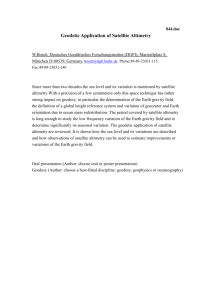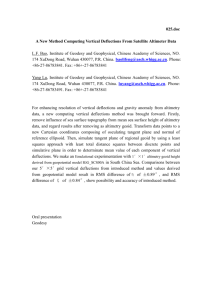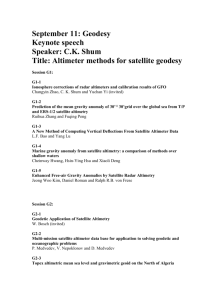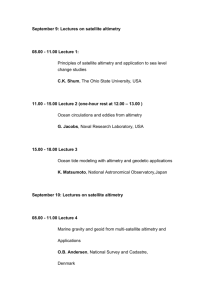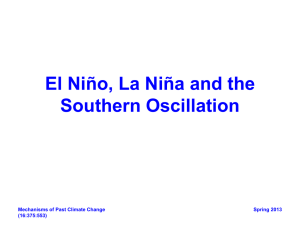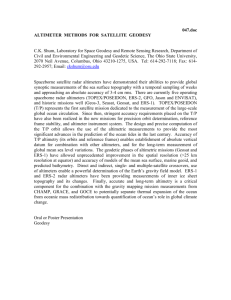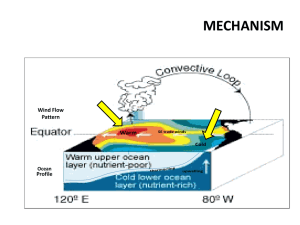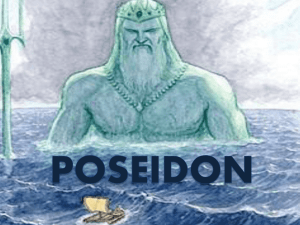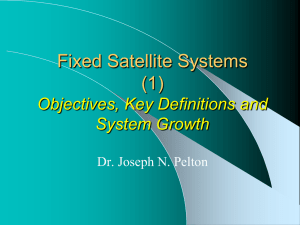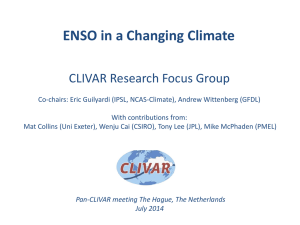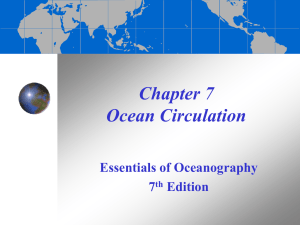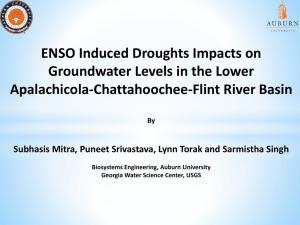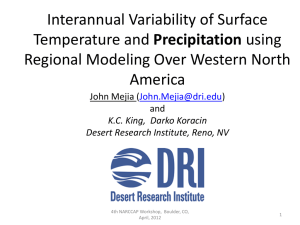Powerpoint
advertisement
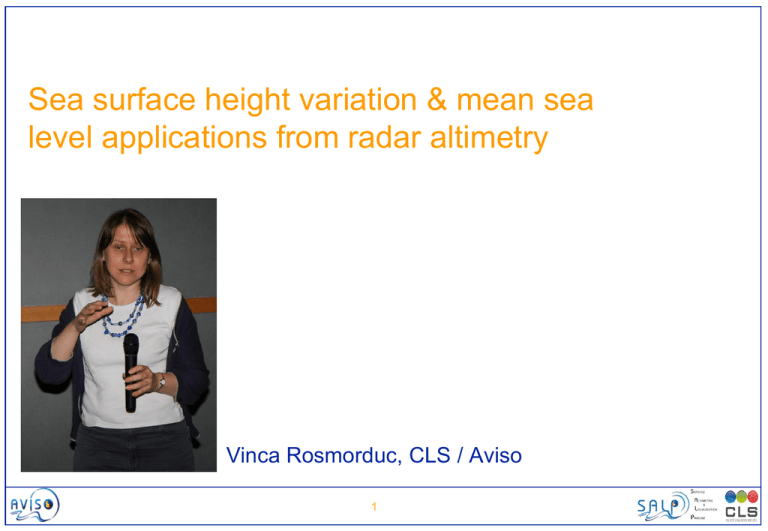
Sea surface height variation & mean sea level applications from radar altimetry Vinca Rosmorduc, CLS / Aviso 1 Aviso? Archiving, Validation and Interpretation of Satellite Oceanographic data French Distributing and Archiving center for satellite altimetry data since 1992 (Topex/Poseidon launch) • Distribution of Altimetry & Doris precise location data • User Helpdesk • Information about Altimetry & Doris, • Promotion of users’ work • Outreach • http://www.aviso.oceanobs.com aviso@oceanobs.com 2 Altimetry applications • Geodesy & geophysics • Climate – Bathymetry – Geodesy – Tsunami – ENSO – NAO – Decadal oscillations • Ocean – – – – – • Atmosphere, wind & waves – Wind & waves – Cyclones – Rain Large-scale circulation Ocean currents and eddies Operational oceanography Tides Mean Sea Level • Hydrology & land – Lake level – Land – River level • Ice – Ice sheets – Sea ice • Coastal 3 Altimetry applications • Geodesy & geophysics • Climate – Bathymetry – Geodesy – Tsunami – ENSO – NAO – Decadal oscillations • Ocean – – – – – • Atmosphere, wind & waves – Wind & waves – Cyclones – Rain Large-scale circulation Ocean currents and eddies Operational oceanography Tides Mean Sea Level • Hydrology & land – Lake level – Land – River level • Ice – Ice sheets – Sea ice • Coastal 4 Past & current altimetry missions • First missions as early as the 70s: proof of concept • Geosat (1985-1989) first conclusive one • Since 1991-92, two continuous time series (ERS-1, ERS-2 & Envisat; Topex/Poseidon, Jason-1, Jason-2) 1973 1978 Skylab Geos-3 Seasat 1974 1978 1985 Geosat 1989 1991 ERS-1 1996 1992 Topex Poseidon 2006 1995 1998 ERS-2 GFO 2011 2001 Jason-1 2002 Envisat 2008 Jason-2 2010 2011 Launches Cryosat HY-2A 2008 Mission ends • Several missions planned in the future years, including ones using new concepts 5 Satellite altimeters - present to future • Past missions (since 1991) – France (CNES)/ USA (NASA) Topex/Poseidon(1992-2006) – Europe (ESA) ERS-1 & 2 (1991-1996, 1995-2011) – US Navy GFO • Altimeters in Orbit (October 2011) – – – – France (CNES)/ USA (NASA) Jason-1 (2001) Europe (EUMETSAT)/ France (CNES)/ USA (NASA/NOAA) Jason-2 (2008) Europe (ESA) Envisat, Cryosat-2 (2010) China (SOA) HY-2A (calibration phase) (2011) • Altimeters in Development – – – – – India (ISRO)/France (CNES) SARAL – April 2012 Europe (ESA) Sentinel-3A – 2013 – 1st of two Europe (EUMETSAT)/ France (CNES) /USA (NOAA) Jason-3 – 2014 Europe (EUMETSAT, ESA) / France (CNES)? /USA (NOAA) Jason-CS 2017 France (CNES)/U.S. (NASA) SWOT 2019 6 Data used • In the following, we will consider mostly results from “gridded merged sea level anomalies” • Gridded : the native altimetry data are a narrow thread, measured just under the satellite. However, one can interpolate between the track to generate a lon,lat grid of data Grid Along-track • Merged: use of the data from several satellites at the same time 7 Merging several satellites: why? Track selection for 4-19 Nov 2002 8 8 JASON Merging several satellites: why? Track selection for 4-19 Nov 2002 9 ERS/Envisat 9 JASON Merging several satellites: why? Track selection for 4-19 Nov 2002 10 GFO TP ERS/Envisat 10 JASON The principle of Altimetry Satellite altimetry enables ocean topography (relief) and its variations to be determined to within a few centimetres. Ocean topography , or “Sea Surface Height” is the difference between the satellite-to-ocean range (calculated by measuring the signal’s round-trip time) and the satellite’s position on orbit with respect to an arbitrary reference surface (a raw approximation of the Earth’s surface, called the reference ellipsoid) Animation 11 Sea Level Anomalies Sea Level Anomalies = SSH – SSHmean SSH – MSS SSH – (Mean Dynamic Topography + geoid) = Sea surface height variations SLA Mean Sea Surface (SSH) 12 Which reflects: Temperature variations Salinity variations Currents variations El Niño Eddies and ocean circulation variations Seasons … What can Sea Level Anomalies show? Eddies (e.g. Kuroshio) Monsoon-linked changes El Niño 13 Eddies and buoys El Niño year after year El Niño 2001-2003 : longitude – time diagram Variance in the Gulf Stream 14 Eddies in the Gulf Stream February 11, 2004 Eddies along the Australian coasts (mean over July) Ierapetra eddy(gyre) A leatherback turtle follows the Gulf Streameddies 15 ENSO seen from altimetry 16 ENSO: El Niño Southern Oscillation Under normal weather conditions, the trade winds, which blow from east to west, push the surface waters of the Pacific towards Australia and the Philippines. This situation creates a reservoir of warm water in the western Pacific (the red area in the image) where the temperature and sea level are higher than in the eastern part of the basin. 17 How El Niño works When El Niño awakes, the reservoir of warm water flows back towards the east. At the same time, triggered by this reservoir, the region of atmospheric convection also shifts. This phenomenon causes the trade winds to weaken. 18 How does this translate in sea level anomalies?? 19 El Niño 1997-1998 seen by altimetry Feb., Apr. 1997: Topex/Poseidon revealed a considerable swelling in the waters of the central Pacific Feb.18,1997 Oct.16,1997 Apr.29,1997 by Nov. 1997, more than 30 cm elevation with respect to mean sea surface over a surface ~North America Jan. 14,1998 Jul. 08,1997 15.0 13.5 12.0 10.5 9.0 7.5 6.0 4.5 3.0 1.5 0.0 -1.5 -3.0 -4.5 -6.0 -7.5 -9.0 -10.5 -12.0 -13.5 -15.0 cm Apr. 08, 1998 20 Chronology • Geosat first saw an El Niño/La Niña event sequence (1987-88) • First seen by Topex/Poseidon in 1993-94 • 1997-98 first real monitoring of the phenomena from its first stages (Feb-April) and on • Several episodes monitored since, including atypical ones (a.k.a. “El Niño Modokis”) 21 Past events and planetary waves 1997 Oct. 1997 2004 Oct. 2004 2009 Oct. 2009 22 Past events and planetary waves • Longitude-time (or Hovmoller) diagram put in evidence the train of planetary waves crossing the Pacific • Such waves play a major role in ENSO 23 Last ENSO episode (2009-2010) May 2009 November 2009 September 2010 March 2010 24 An ENSO index computed from altimetry Index computed from merged Sea Level Anomalies and normalized. (Nino3.4 region) It matches well the classical index for ENSO 25 Global Mean Sea Level 26 Global sea level: an indicator of climate change • What factors trigger changes in average sea level? © WMO/UNEP 27 Mean sea level measured by satellite altimetry since 1993 increase: 3.2 +/- 0.6 mm/yr Projections (semi-empirical methods) IPCC 2007 Projections Mean sea level measured by tide gauges (Church & White, 2006) 28 Nicholls & Cazenave, Science, 2010 Sea Level: a sensitive index for climate change • In situ and satellite observations indicate that sea level is currently rising, • Models predict sea level will continue to rise in the future decades, • But how much ? We don’t know • Coastal impacts of sea level rise are among the most threatening consequences of global warming, • Continuous and accurate monitoring of sea level change (globally and regionally) is a high priority objective • satellite altimetry enable this! 29 Mean Sea Level since 1992 as seen by altimeters +3.2 +/- 0.6 mm/yr since late 1992 30 Altimetry global, synthetic, homogeneous measurements Removing annual and semi-annual signals, Glacial Isostatic Ajustment Correcting the data as best as possible Mean Sea Level: geographical trends • Mapping the mean variation in sea level over a long period reveals the complexity of the phenomena involved. • Most of the variations seen on the map are for now from interannual variability rather than from climate change Even longer time series, more regional to local studies are needed! 31 Mean Sea Level: geographical trends • NOTICE: local conditions can’t be inferred from this map – Subsidence – Sediment transport – Regional variation of glacial isostatic adjustment – Etc. Must be taken into account. Studies to evaluate risk at local scale must be local! • Such global data give boundary conditions and general trend. 32 More information www.aviso.oceanobs.com 33
